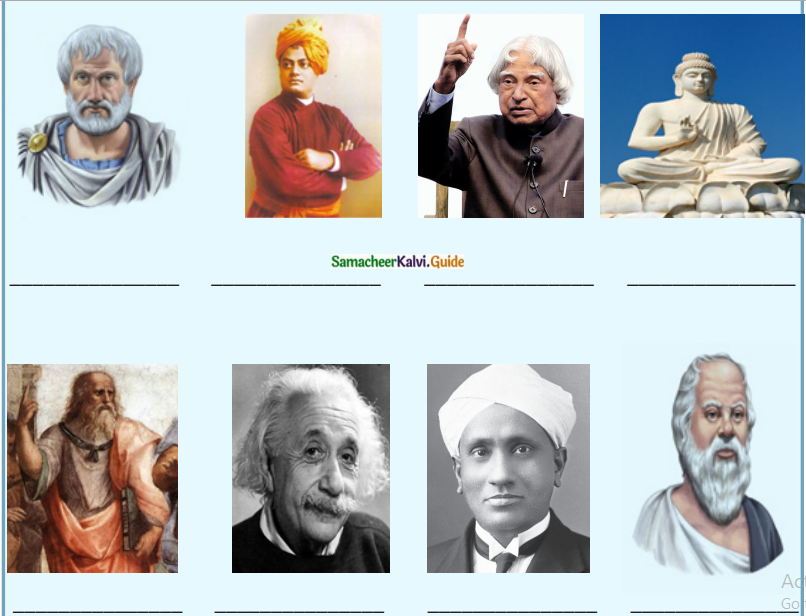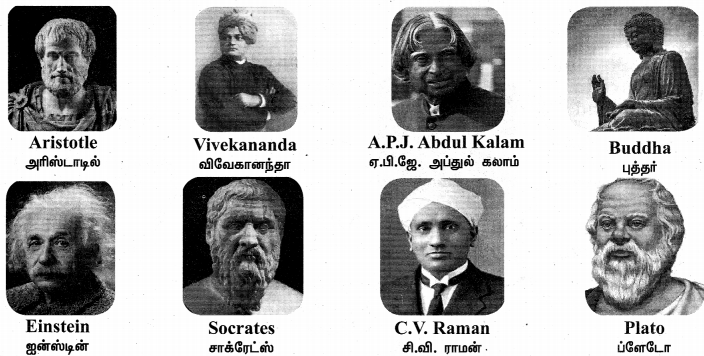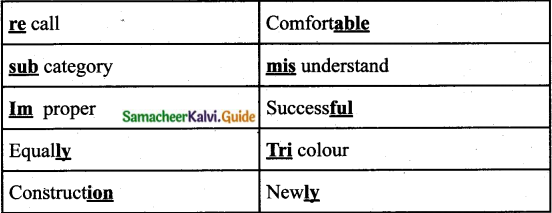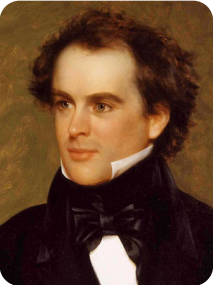Tamilnadu State Board New Syllabus Samacheer Kalvi 8th English Guide Pdf Prose Chapter 3 Sir Isaac Newton – The Ingenious Scientist Text Book Back Questions and Answers, Summary, Notes.
Tamilnadu Samacheer Kalvi 8th English Solutions Prose Chapter 3 Sir Isaac Newton – The Ingenious Scientist
8th English Guide Sir Isaac Newton – The Ingenious Scientist Text Book Back Questions and Answers
Warm Up (Text Book Page No. 63)
In pairs, identify the great thinkers of the world and write the names from the box. (Text Book Page No. 63)


Section – I
Textual Exercise (Text Book Page No. 66)
Read and Understand (Text Book Page No. 66)
A. Fill in the blanks.
1. Isaac Newton was born at ……………
Answer:
Woolsthorpe
2. Grandmother was advised to apprentice him to a ……………
Answer:
clockmaker
3. Isaac made a clock, by the dropping of ……………
Answer:
water
4. The sun-dial made by Isaac is still in existence at ……………
Answer:
Woolsthorpe
![]()
5. Isaac constructed a model of the …………….
Answer:
windmill
B. Choose the correct synonyms for the italicized words.
1. Isaac was chiefly remarkable for his ingenuity.
a) common
b) notable
c) neglected
d) unknown
Answer:
b) notable
2. He will make a capital workman.
a) wealth
b) excellent
c) profitable
d) head
Answer:
d) head
3. Nobody could tell what the sunshine was composed of.
a) made
b) known
c) full
d) felt
Answer:
a) made
![]()
4. But he cared little for earthly fame and honors.
a) disrespect
b) attraction
c) proud
d) popularity
Answer:
a) disrespect
Section – II
Textual Exercise (Text Book Page No. 69)
Read and Understand (Text Book Page No. 69)
A. Choose the correct Synonyms for the italicized word.
1. His Grandmother was very kind to him.
a) affectionate
b) loving
c) disrespectful
d) cruel.
Answer:
d) cruel
2. The boy seemed to have a taste for mathematics.
a) delicious
b) sweet
c) dislike
d) against
Answer:
c) dislike
![]()
3. Isaac possessed a wonderful faculty of acquiring knowledge.
a) owned
b) controlled
c) lacks
d) have
Answer:
c) lacks
4. He was observed to be usually busy with his tools.
a) common
b) rarely
c) unwantedly
d) usually
Answer:
b) rarely
B. Answer the following questions in one or two. (Text Book Page No. 70)
1. Who was taking care of Newton after his father’s death?
Answer:
His grandmother was taking care of Newton after his father’s death.
2. What did Isaac manufacture at his young age?
Answer:
Issac manufactured many curious articles at a young age.
3. How did the young boy find the strength of the wind?
Answer:
The young boy found the strength of the wind by first jumping against the wind. According to the length of his jump, he could calculate the force of a gentle breeze, a brisk gale or a tempest.
![]()
4. Why were his friends attracted by the windmill?
Answer:
The playmates of Newton were attracted by the model of windmill. They thought it to be pretty and wonderful.
5. How was Newton honored by the king?
Answer:
Newton was made a Member of the Parliament and received the honour of knighthood from the king.
C. Answer the following in about 100 words.
1. Why did Newton’s friends advise his grandmother to apprentice him to a clockmaker?
Answer:
Issac seemed to have taste for mathematics besides his mechanical skills. His taste for Maths would be useful to him in clock making. Issac made a kind of clock which would work by the dropping of water. Besides the water clock, Issac made a sun-dial. The sundial is said to be in still in existence at Woolsthorpe, on the comer of the house where Issac dwelt.
![]()
2. How did Newton learn about the way a windmill operated?
Answer:
Newton frequently went to the windmill that operated on a new plan. He spent hours examining the various parts of the windmill. When the mill was not working, he examined its internal machinery. When the windmill’s broad sails were in motion by the wind, Newton examined the process by which the mill-stones revolved and crushed the grains, put into its hopper. Thus Newton gained a thorough knowledge of the construction and operation of the windmill.
3. Mention some of Newton’s inventions.
Answer:
Reflecting telescope, laws of motion, law of gravity are the famous inventions of Sir Issac Newton. He also discovered Calculus. He was the first one to find out the nature of light. He searched out the laws by which the planets are guided through the sky.
Vocabulary (Text Book Page No. 70)
Prefix and Suffix
a. Underline the prefix in each word in the boxes: (Text Book Page No. 71)


b. Pick a suitable Prefix and suffix from the given box and complete the following words:
able, ful, ly, sub, ion, un, tri, re, im, mis


Syllabification
Syllabify the words: (Text Book Page No. 73)
- education – 4 Syllables
- school – 1 Syllable
- college – 2 Syllables
- English – 2 Syllables
- opportunity – 4 Syllables
- friend – 1 Syllable
- teacher – 2 Syllables
- simultaneously – 6 Syllables
- laboratory – 4 Syllables
- beneficiary – 5 Syllables
Listening (Text Book Page No. 74)
Listen to the passage carefully and write the answer.
Note: The listening passage is given on page no. 227
Questions:
1. Name the scientist.
Answer:
The name of the scientist was Sir Alexander Fleming.
![]()
2. What did he discover?
Answer:
He discovered Penicillin.
3. Who approached the scientist?
Answer:
Two journalists approached the scientist.
4. What was the question by the journalist?
Answer:
The journalists wished to know what a great scientist would think before his breakfast.
5. When did they meet the scientist?
Answer:
They met the scientist when he was about to have his breakfast.
Speaking (Text Book Page No. 74)
Take a few minutes and make hints of the picture. Arrange your thoughts. Using the points you write, deliver a small speech focusing the issue picturised here. Give an interesting and informative speech. Your speech should include the cause and the solution.

Tips for effective speaking:
- Organise your points and ideas well.
- Don’t memorise the speech. If you forget a point, it will make you nervous.
- Avoid the things that are of no value or interest to the audience.
- Before you speak, take a deep breath, smile, greet the audience.
- Don’t be nervous about making a mistake.
- Interesting speech makes your mistakes nothing.
In this picture, we see a number of chimneys emitting smoke. These buildings may be factories or mills. There are green lawns and a few trees found in this picture. We also see a number of vehicles on the road. The smoke from the factories and vehicles create air pollution and noise pollution. There is a water source and dumping of garbage is found in the lower part of the picture. The garbage will make the water polluted. Water is already scarce in our towns. We must take serious remedial measures against air pollution, water pollution, and noise pollution to save our environment. We must promote eco-friendliness in the young minds.
Writing (Text Book Page No. 75)
H) Write a character sketch of any character from a fiction that has made an impact on you.
Headings:
1. Introduction of the person:
Answer:
Jane, an orphan, the heroine of the fiction, ’Jane Eyre’ written by Charles Bronte is my favorite character.
2. Character:
Answer:
Jane a poor orphan, who lost both her parents at an early stage suffer hell at the house of her uncle Mr. Reed. Mr. Reed died. He liked her very much. Even when he died he asked his wife to promise of taking care of her after his death. Still, Mrs. Reed never liked Jane. Jane was treated cruelly by the children of Mrs. Reed. Once, Mrs. Reed sent Jane to a charity school at Lowood.
![]()
3. Talk about what others say about the character :
Answer:
The servant-maid Bessie sympathised with Jane for her sufferings. Miss. Temple and Miss. Miller’s teachers of the charity school at Lowood took pity on her. They felt she was too young to be sent alone like that. They thought since she knew reading and writing she would do well in her studies.
4. Write if the character appealed to you, with reasons:
Answer:
Definitely, the character of Jane is impressive. She lost her parents. She was an orphan. She was tormented in her aunt’s house. The school she studied gave her semi-starvation and unbearable cold environment. In the bathroom, they had only frozen water. In spite of the ordeal, Jane got educated. She started working as a teacher in the same school. She got an appointment as a governess in the house of Rochester at Thornfield.
5. Support your views with evidence from the text.
Answer:
Jane treats her pupil Adela, the ward of Mr. Rochester in a way that is convincing for the child. Adela likes painting, drawing, singing, and dancing. Jane appreciates her skills and talents. Adela gets attracted to Jane. Jane skilfully befriends the pupil Adela and breaks the ice. Adela starts liking Jane.
Grammar (Text Book Page No. 75)
a) Fill in the blanks by using correct preposition.
1. We go to school ____ Mondays, but not on Sunday
Answer:
on
2. Christmas falls ____ 25th December.
Answer:
on
3. Buy me a present ____ my birthday.
Answer:
on
4. Families often argue ____ Christmas time.
Answer:
in
5. I work faster ____ night.
Answer:
at
![]()
6. Her shift finished ____ 7 p.m.
Answer:
at
Model Verbs (Text Book Page No. 76)
Circle the modal verbs in the list given in the box (Text Book Page No. 75)


I. Use polite request when we seek help from others. Page – 78)
a) Fill in the blanks using would you or could you.
1. ……………. please close the door?
Answer:
Could you
2. ……………. please open the window?
Answer:
Could you
3. ……………. mind going to the backbench?
Answer:
Would you
4. ……………. please bring some water for me?
Answer:
Could you
b) Use the phrases could you or would you in the following situations with your friend.
1. Ask the policeman for directions.
Answer:
Could you direct me to the temple?
2. You need to borrow your friend’s bike.
Answer:
Could yo lend me your bike?
![]()
3. You would need to exchange the book purchased.
Answer:
Would you mind my exchanging the book purchased?
4. You want to open your classroom window.
Answer:
Would you mind opening the classroom window?
Sir Isaac Newton – The Ingenious Scientist Summary in English

Issac Newton was born on the Christmas day, at Woolsthrope in England in 1642. His mother got remarried after his father’s death. Newton was with his grandmother. Newton created curious articles. He became an apprentice to a clockmaker. He observed the functioning of a windmill nearby. He then contacted a model of the windmill. Newton engaged himself in mathematics and philosophy. He found the nature of light, laws of motion, law of gravity, and also calculus. He was honoured with knighthood. He was a scientist, astronomer, and also a mechanical genius.
Sir Isaac Newton – The Ingenious Scientist Summary in Tamil
ஐசக் நியூட்டன் 1642ம் ஆண்டு கிறிஸ்துமஸ் தினத்தன்று உல்ஸ்த்தார்ப் என்ற இடத்தில் இங்கிலாந்தில் பிறந்தார். அவரது தந்தை இறந்த பிறகு அவரின் தாயார் மறுமணம் செய்து கொண்டார். நியூட்டன் தன் பாட்டியிடம் வளர்ந்தார். நியூட்டன் ஆச்சரியமான சிறியப் பொருட்களை உருவாக்கினார். கடிகாரம் செய்பவரிடம் தொழில் கற்கும் வேலைக்கு அமர்ந்தார். அருகில் உள்ள காற்றாலையின் செயல்பாட்டை உற்று நோக்கியவர் ஒரு சிறிய காற்றாலை மாதிரியை தானே உருவாக்கினார். நியூட்டன் கணிதம், தத்துவம் போன்ற புத்தகங்களைப் படிப்பதில் தன்னை ஈடுபடுத்திக் கொண்டார். அவர் ஒளியின் இயல்பு, இயக்க விதிகள், புவி ஈர்ப்பு விசை விதி போன்றவற்றைக் கண்டுபிடித்தார். அவர் வானியல், அறிவியல் மட்டுமல்ல, இயந்திரங்களை இயக்குவதிலும் வல்லுனராய் திகழ்ந்தார்.
![]()
Sir Isaac Newton – The Ingenious Scientist About the Author in English
The biography of Sir Isaac Newton was published in Nathaniel Hawthorne’s, True Stories from History and Biography (1851). As Newton observed after a life¬time of discoveries: “I seem to myself like a child,” he observed, “playing on the seashore, and picking up here and there a curious shell or a pretty pebble, while the boundless ocean of truth lies undiscovered before me”.
Sir Isaac Newton – The Ingenious Scientist About the Author in Tamil
சர் ஐசக் நியூட்டனின் – வாழ்க்கை சரிதம், நாதனியல் ஹாத்தார்ன் என்பவரால் 1851ஆம் ஆண்டு வெளியிடப்பட்டது. “சரித்திரம் மற்றும் வாழ்க்கை சரிதம்: இவற்றின் உண்மைக் கதைகள்” என்ற புத்தகம் அது நியூட்டன் தன் வாழ்நாள் கண்டுபிடிப்புகளுக்கு பிறகு சொன்னார், ‘நான் ஒரு குழந்தை போன்றவன். கடற்கரையில் சில சிப்பிகளையும் அழகிய கூழாங்கற்களையும் தான் கண்டெடுத்துள்ளேன். இன்னும் கண்டுபிடிக்க வேண்டிய விஷயங்கள் கரைகாணாத கடல் போல் என்முன்னே உள்ளன’.